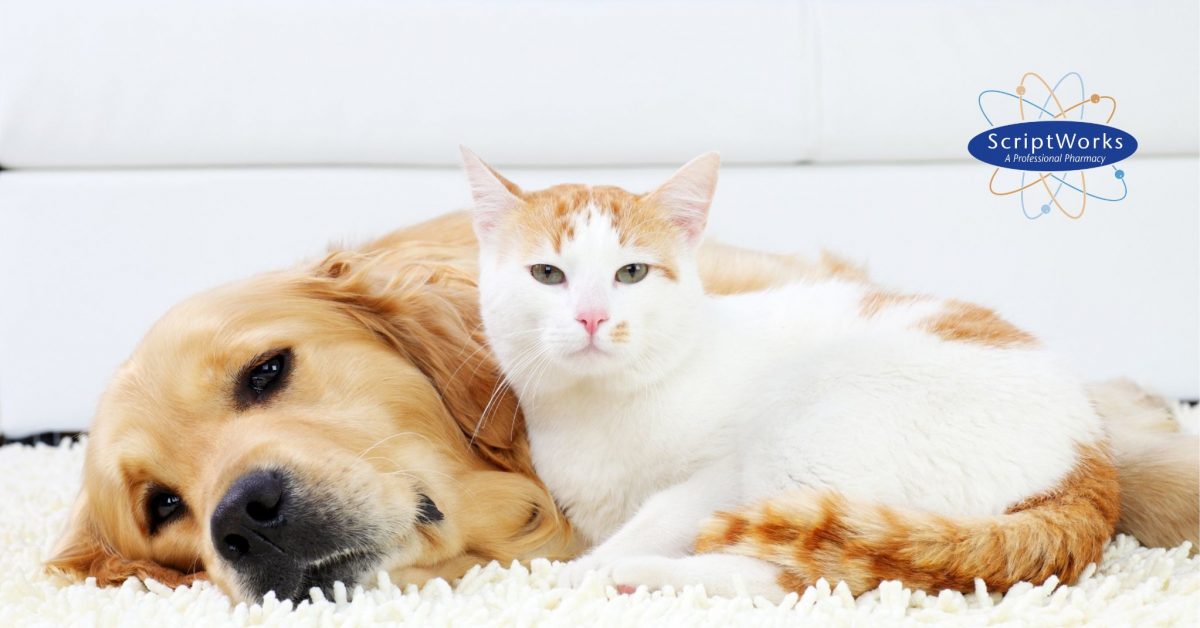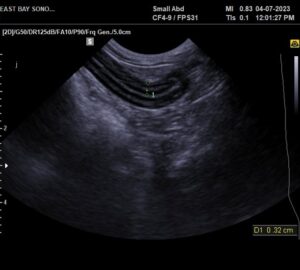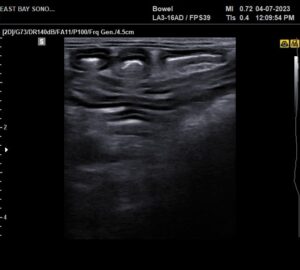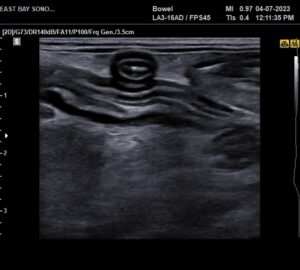
Author: Bob Brensel | President, Pharmacist | ScriptWorks
Bob Brensel, RPh, earned his Pharmacy Degree at University of the Pacific in Stockton, California in 1980. Former California Pharmacists Association’s Award Winner for Recognition of Outstanding Achievement in Compounding Pharmacy. Read More →
Our Budesonide Therapy Services and Everything Else You Need to Know
Budesonide is a systemic glucocorticoid (steroid) used to treat inflammatory bowel disease (IBD) in dogs and cats, especially when other steroids are ineffective, or the pet cannot tolerate steroids.
The Nitty-Gritty on Budesonide Therapy
The use for gastrointestinal (GI) issues like IBD is considered an “off label” use of this drug. This means that a drug company does not seek FDA approval for this use in animals. According to several studies, the fasting pH in dogs (7.3 ± 0.09) is consistently higher than that in humans (6.0 ± 0.14). This is very important to compounding pharmacists designing dosage forms that will remain intact until they reach the intestines.
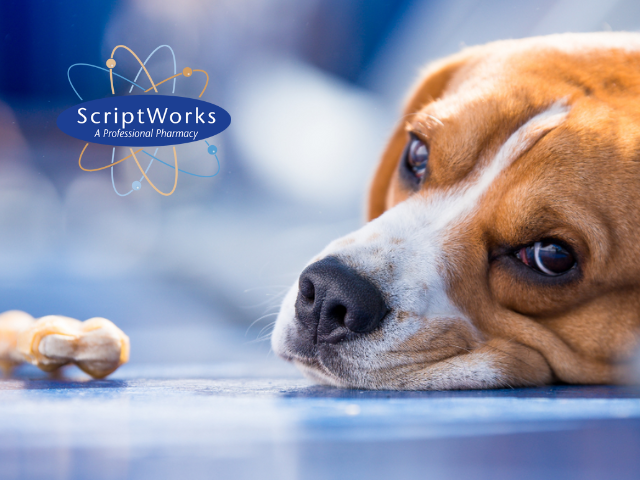
Budesonide depresses the activity of endogenous chemical mediators of inflammation such as prostaglandin and kinins.
It has been proposed for helping patients that are intolerant of systemic steroids; evidence of fewer adverse effects as compared with other oral glucocorticoids is lacking. In studies of dogs with chronic inflammatory enteropathies (previously termed inflammatory bowel disease (IBD), modest clinical and/or histopathological response was noted.
How a Compounding Pharmacy May Help
At ScriptWorks, Budesonide therapy has become one of the most commonly compounded prescriptions we make.
At first, we thought that it might not be absorbed well enough to be effective. Interestingly, in a study, it was demonstrated that budesonide powder and prednisone were equally efficacious at inducing remission in dogs with inflammatory bowel disease.

At first, we thought that it might not be absorbed well enough to be effective. Interestingly, in a study, it was demonstrated that budesonide powder and prednisone were equally efficacious at inducing remission in dogs with inflammatory bowel disease.
ScriptWorks is proud to offer Budesonide to our animal patients if their veterinarian feels it is necessary. Budesonide comes in Script Tabs (Tiny), oral suspensions, capsules, and chewable treats.
Related Product:
Script Tabs from ScriptWorks are tiny tablets that can be flavored, and chewed or dissolved in the mouth.
Script Tabs are an efficient and stable veterinary dosage form, and measure just 3 mm wide. They’re ideal for smaller dogs and cats where a larger tablet can be tough to administer.
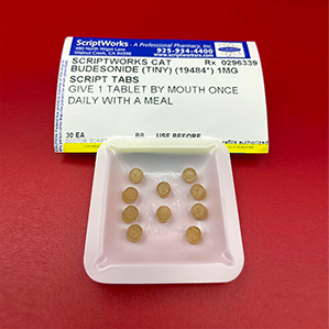
Medications we compound with Script Tabs:
- Alendronate
- Amantadine
- Amlodipine
- Amoxicillin
- Aspirin
- Atenolol/Benazepril
- Azithromycin
- Benazepril
- Budesonide
- Cetirizine
- Chlorambucil
- Chloramphenicol
- Cisapride
- Clarithromycin
- Clopidogrel
- Diethylstilbesterol
- Diltiazem
- Diphenhydramine
- Doxycycline
- Estriol
- Famotidine
- Fluoxetine
- Gabapentin
- Hydroxyzine
- Imipramine
- Ketamine
- Levetiracetam
- Loperamide
- Marbofloxacin
- Maropitant Citrate
- Meloxicam
- Methimazole
- Methocarbamol
- Metronidazole
- Mexilitine
- Mirtazepine
- Mitotane
- Mycophenolate
- Naltrexone
- Ondansetron
- Phenoxybenzamine
- Phenylpropanolamine
- Pimobendan
- Prazosin
- Prednisolone
- Pregabalin
- Selegiline
- Sildenafil
- Sotalol
- Telmisartan
- Terbutaline
- Testosterone
- Triamcinolone
- Acetonide
- Trilostane
- Ursodiol
- Zonisamide
Inflammatory Bowel Disease (IBD) in Cats
Dr. Ayeley Okine, a veterinary specialist in internal medicine, and owner of East Bay SonoVet Services has contributed ultrasound photos showing images of an older cat’s intestines where the muscular layer of the intestine is too thick.
This is very common in cats with inflammatory bowel disease or small cell lymphoma. The lymph nodes are slightly enlarged as well.
Subscribe below in the footer to learn more about Compounding Medication for Veterinary Practices or contact us for more information.
The East Bay’s Most Trusted Customized Health Services
Our goal at ScriptWorks is to be an invaluable resource for our local veterinarians and their patients. If you have any questions about a difficult case or specially dosed/flavored medicine for animals, give us a call at (925) 934-4400 or text us at (925) 667-3834.
Other References
- Rychlik A, Kolodziejska-Sawerska A, Novicki M, Szweda M. Clinical, endoscopic and histopathological evaluation of the efficacy of budesonide in the treatment of inflammatory bowel disease in dogs. Polish Journal of Veterinary Sciences. 2016;19(1):159–164.
- Pietra M, Fracassi F, Diana A, et al. Plasma concentrations and therapeutic effects of budesonide in dogs with inflammatory bowel disease. Am J Vet Res. 2013;74(1):78–83.
- Dye TL, Diehl KJ, Wheeler SL, Westfall DS. Randomized, Controlled Trial of Budesonide and Prednisone for the Treatment of Idiopathic Inflammatory Bowel Disease in Dogs. Journal of Veterinary Internal Medicine. 2013;27(6):1385–1391.
- Trepanier L. Idiopathic inflammatory bowel disease in cats Rational treatment selection. J Feline Med Surg. 2009;11(1):32–39.

